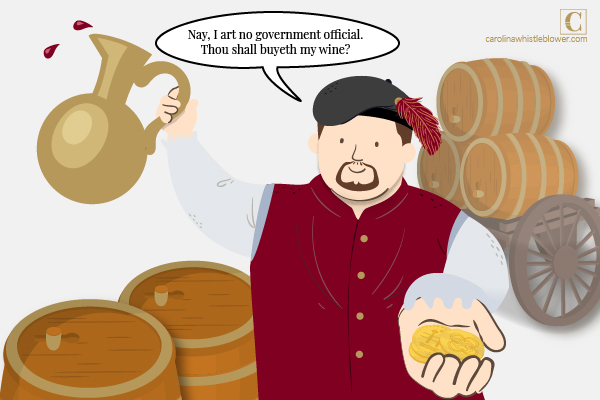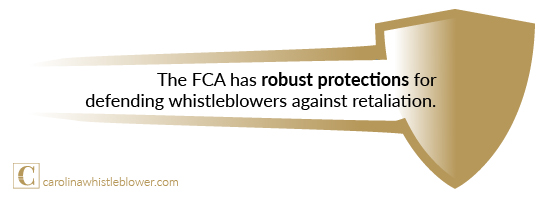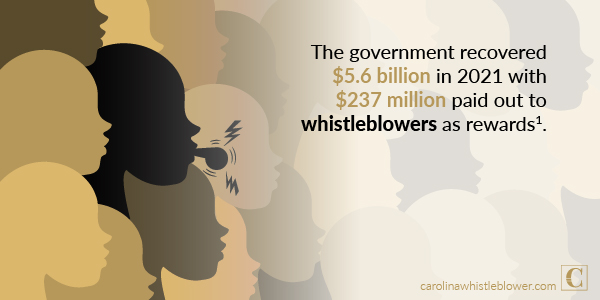Whistleblowers do their patriotic duty by protecting society from wrongdoers who make false claims and steal from the government. They help combat fraud by presenting material evidence in False Claims Act cases based on their actual knowledge of fraudulent claims that resulted in the loss of taxpayer money.
Or, in plain language, whistleblowers expose fraud against the government.
As a qui tam attorney, I work with whistleblowers and the False Claims Act (FCA) every day. It’s a unique and important law, and if you’re considering becoming a whistleblower, you may become part of its history and legacy. Here’s how the FCA became what we know today, and why it may be just the tool you need to seek justice.
What is the False Claims Act?
The False Claims Act enables whistleblowers to hold fraudsters accountable for making false statements and committing fraud against states or the federal government. Accountability can come through a settlement or through a civil proceeding, like a jury trial.
Here are some common examples of False Claims Act violations that may go unpunished without whistleblowers like you:
- A hospital, device manufacturer, or others in the healthcare field overcharging the government for tests, treatments, and services.
- A university creating fake student credentials so they can fraudulently obtain federal education funds.
- A business damaged in a natural disaster inflating their relief aid claim with excessive damages to increase their bottom line.
- A contractor lying about their eligibility to bid on government contracts reserved for businesses owned by veterans, minorities, and the disabled.
- A defense contractor charging full price but providing sub-par products that break or malfunction when our soldiers use them on the battlefield.
- A home lender knowingly approving fraudulent loan applications for government-backed mortgages. This is the exact type of fraud that led to the economic crisis in 2008.
- An energy company conspiring with its competitors to underpay land leasing royalties to the government.
The origins of whistleblower laws
Whistleblower laws originated in 14th century England, when King Edward II offered a reward of one-third the penalty to those who successfully sued government officials illegally moonlighting as wine merchants (it was a big problem, apparently).

In the 16th century, Henry VIII enacted a law in English Parliament which gave the common citizen the right to sue on behalf of the government regarding false claims over land title disputes.
These lawsuits were known as qui tam actions, which is a shortened version of the Latin phrase, “qui tam pro domino rege quam pro se ipso in hac parte sequitur.” This means, “he who brings a case on behalf of our lord the king, as well as for himself.”
Laws in early American colonies, including South Carolina, incentivized whistleblowers to bring a lawsuit for instances of false claims and fraud. Whistleblowers often received one-third of the penalty. This tradition of public whistleblowing would remain important as the U.S. colonies declared independence and formed their own laws.
Did You Know? Those who report fraud and bring qui tam actions on behalf of the government are called “relators” because they relay key information to their attorneys and the government.
When was the U.S. False Claims Act enacted?
During the Civil War, President Lincoln urged Congress to pass the False Claims Act in response to rampant fraud affecting Union soldiers’ combat effectiveness and ultimately costing American lives.
Unscrupulous vendors sold the Union army a host of worthless goods, including:
- Boots made of cardboard
- Bullets and artillery filled with sawdust
- Faulty, broken rifles
- Mules and cavalry horses that were old, sickly, and untrained
- Spoiled rations
- Rotted ships painted to look new
The False Claims Act, or “Lincoln’s Law” as it came to be known, made provisions for the United States government to reward private citizens who successfully sued wrongdoers who were defrauding it.
As the U.S. grew and changed, new opportunities for fraud arose, and Congress had to respond. For example, in the 1980s, as U.S. defense spending increased, government contractors tried to defraud the government by grossly overcharging for products and services.
In response, Congress modified the False Claims Act to increase the financial incentive for help with combating fraud. Now, the False Claims Act allows relators to receive up to 30% of the government’s recovery in successful qui tam lawsuits.
Have you heard of these famous whistleblowers throughout history?
What protections are there for whistleblowers?
Those who wish to bring qui tam cases may be concerned about their jobs.
Fortunately, the FCA has robust protections that attorneys can use for defending whistleblowers against retaliation.

These protections broadly include:
- Anonymity for whistleblowers during the government’s investigation while the lawsuit is sealed
- Potential remedies for retaliation, including:
- Back pay for lost wages and benefits as a result of being unlawfully terminated
- Job reinstatement
- Special damages sustained as a result of the retaliation
- Damages for pain and suffering
Learn More: How an Attorney Protects Courageous Whistleblowers
What is the impact of the False Claims Act?
According to a press release from the U.S. Department of Justice, judgments and settlements resulting from enforcement of the False Claims Act exceed $70 billion since 1986. Furthermore, whistleblower cases have resulted in $48.2 billion in recoveries from 1987 to 2021. This means that more than 70% of the government’s total False Claims Act recovery resulted from whistleblowers coming forward.1,3
The government recovered $5.6 billion in 2021 alone, more than double the $2.2 billion recovered in the previous year. Of that, $1.6 billion arose from 598 qui tam lawsuits, resulting in $237 million paid out to whistleblowers as rewards in 2021.1,3

“When people cheat the government, that results in less services and aid for everyone. At the end of the day, whistleblowers just want to right a wrong.”
- Carolina Whistleblower Attorney and Former U.S. Attorney for South Carolina Bill Nettles
Why do people continue to become whistleblowers today?
Financial reward is one of the major reasons why people come forward as whistleblowers. It’s a fact that the provision entitling whistleblowers to a reward of up to 30% of the government’s recovery in a successful qui tam lawsuit is a very enticing incentive.
But money isn’t everything, and whistleblowing takes courage. What often drives whistleblowers is their personal sense of right and wrong.
Whistleblowers have knowledge of crimes committed by businesses and others to defraud taxpayers. For many people, knowing that a company or individual is committing such fraud offends their sense of personal integrity and they feel they must do something to right the wrong. They may also be concerned about the integrity of their profession and want to protect their industry from fraud.
As a result, they bravely stand up for themselves and their fellow citizens by calling out their employers, business associates, or other entities for fraud. If you believe you may have a whistleblower case, you have the opportunity to come forward on behalf of the taxpaying public to try to expose fraud and help stamp out corporate greed.
How do I know if I have a case?
Sometimes, it can be hard to tell if someone’s cheating the government, especially because wrongdoers often go to great lengths to conceal their actions.
Perhaps you suspect that your employer made false claims to receive government benefits. Maybe you’ve seen possible evidence that they overcharged for goods and services, but don’t know for certain. It can put you in an uncomfortable position if you suspect but don’t know how to prove wrongdoing against the government by your company or another entity.
Even if you’re merely suspicious, you should reach out to a whistleblower attorney who can help you determine if you’ve got a case or not. Don’t delay because it’s usually only the first person to come forward with actionable evidence who can ultimately receive a possible award.
What should I do if I suspect fraud against the government?
If you have information or evidence of someone committing fraud against the government, contact us for a no-obligation case evaluation.
The first step is a free, confidential conversation where you can share what you know. We’ll then evaluate your information based on our decades of combined experience to advise you of your options.
If we think your case can be successful and it is in your best interests, we can move forward together.
Whistleblowers play a vital function in society by helping to hold fraudsters accountable when they steal from taxpayers by ripping off the U.S. government. When you successfully hold companies accountable as a whistleblower, you’re not just profiting personally – you’re doing the right thing. To get started, call us at 1-888-292-8852 or contact us online today.
Similar Articles
Hiring an Attorney | March 17, 2024
What Is a U.S. Attorney? And How a Former One Helps Your FCA Whistleblower Case
A U.S. attorney is a White House-appointed prosecutor and the top law enforcement officer for...
North Carolina Whistleblower | September 07, 2023
The Whistleblower Process in North and South Carolina: An Infographic
When people cheat the government, they are also cheating the taxpaying public that the government...
Government Fraud | July 28, 2023
What if the Government Decides Not to Pursue Your Whistleblower Case?
When a whistleblower files a qui tam lawsuit alleging fraud against the government, the Department...
Contact the Carolina
Whistleblower Attorneys
If you’re wondering if it’s a good idea to speak with a whistleblower lawyer about what you know, let us set the record straight.
- Corporate ethics hotlines can be risky and may lead to termination. If you’ve already done this, call us immediately.
- Your coworkers could be aware of the fraud – or complicit in it – and you should not talk to them about it.
- The first claim to be filed under the False Claims Act can proceed – if you’re not first, you’re at a serious disadvantage and may get nothing (another reason not to speak to your coworkers about it).
- A confidential discussion costs you a few minutes, but could save you time, stress, and money.
"*" indicates required fields
